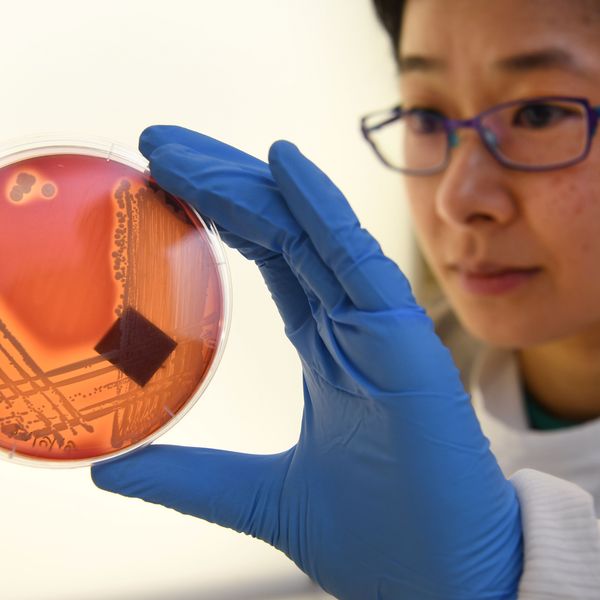Bumblebees, Too, Face Threat from Toxic Pesticides: Study
Findings see damaged colonies much like that observed in their honeybee cousins
A new study by British scientists released Sunday shows that exposure to a combination of common pesticides kills bumblebees at alarming rates and matches similar findings from research with their smaller cousin, the honeybee.
As environment editor at the Independent Michael McCarthy describes, "The findings, which come from a Government-funded study, represent the fifth major piece of research to appear this year linking the worldwide and worrying declines of bees to pesticides, and in particular to the use of the relatively new nerve-agent pesticides, the neonicotinoids."
"This new study is considered particularly important," he reports,
because bees forage widely so are likely to encounter more than one type of pesticide."
The study found that chronic exposure to the chemicals "increases the propensity of colonies to fail," the authors of the study wrote in the journal Nature. The pesticides containing neonicotinoid and pyrethroid, they found, "impair natural foraging behavior and increases worker mortality, leading to significant reductions in brood development and colony success," they said.
Reporting by The Guardian notes that a 2011 UN report "estimated that bees and other pollinators such as butterflies, beetles or birds do work worth EUR153bn ($200bn) a year to the human economy and are in decline in many nations."
'The Buzz about Pesticides,' a video by Nature:
# # #
An Urgent Message From Our Co-Founder
Dear Common Dreams reader, The U.S. is on a fast track to authoritarianism like nothing I've ever seen. Meanwhile, corporate news outlets are utterly capitulating to Trump, twisting their coverage to avoid drawing his ire while lining up to stuff cash in his pockets. That's why I believe that Common Dreams is doing the best and most consequential reporting that we've ever done. Our small but mighty team is a progressive reporting powerhouse, covering the news every day that the corporate media never will. Our mission has always been simple: To inform. To inspire. And to ignite change for the common good. Now here's the key piece that I want all our readers to understand: None of this would be possible without your financial support. That's not just some fundraising cliche. It's the absolute and literal truth. We don't accept corporate advertising and never will. We don't have a paywall because we don't think people should be blocked from critical news based on their ability to pay. Everything we do is funded by the donations of readers like you. Will you donate now to help power the nonprofit, independent reporting of Common Dreams? Thank you for being a vital member of our community. Together, we can keep independent journalism alive when it’s needed most. - Craig Brown, Co-founder |
A new study by British scientists released Sunday shows that exposure to a combination of common pesticides kills bumblebees at alarming rates and matches similar findings from research with their smaller cousin, the honeybee.
As environment editor at the Independent Michael McCarthy describes, "The findings, which come from a Government-funded study, represent the fifth major piece of research to appear this year linking the worldwide and worrying declines of bees to pesticides, and in particular to the use of the relatively new nerve-agent pesticides, the neonicotinoids."
"This new study is considered particularly important," he reports,
because bees forage widely so are likely to encounter more than one type of pesticide."
The study found that chronic exposure to the chemicals "increases the propensity of colonies to fail," the authors of the study wrote in the journal Nature. The pesticides containing neonicotinoid and pyrethroid, they found, "impair natural foraging behavior and increases worker mortality, leading to significant reductions in brood development and colony success," they said.
Reporting by The Guardian notes that a 2011 UN report "estimated that bees and other pollinators such as butterflies, beetles or birds do work worth EUR153bn ($200bn) a year to the human economy and are in decline in many nations."
'The Buzz about Pesticides,' a video by Nature:
# # #
A new study by British scientists released Sunday shows that exposure to a combination of common pesticides kills bumblebees at alarming rates and matches similar findings from research with their smaller cousin, the honeybee.
As environment editor at the Independent Michael McCarthy describes, "The findings, which come from a Government-funded study, represent the fifth major piece of research to appear this year linking the worldwide and worrying declines of bees to pesticides, and in particular to the use of the relatively new nerve-agent pesticides, the neonicotinoids."
"This new study is considered particularly important," he reports,
because bees forage widely so are likely to encounter more than one type of pesticide."
The study found that chronic exposure to the chemicals "increases the propensity of colonies to fail," the authors of the study wrote in the journal Nature. The pesticides containing neonicotinoid and pyrethroid, they found, "impair natural foraging behavior and increases worker mortality, leading to significant reductions in brood development and colony success," they said.
Reporting by The Guardian notes that a 2011 UN report "estimated that bees and other pollinators such as butterflies, beetles or birds do work worth EUR153bn ($200bn) a year to the human economy and are in decline in many nations."
'The Buzz about Pesticides,' a video by Nature:
# # #

